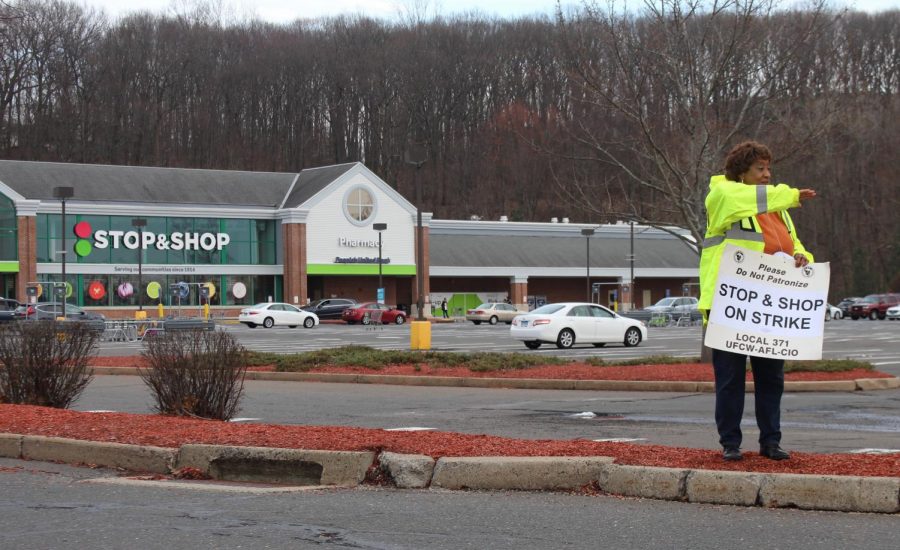Facing Cutbacks, Stop And Shop Workers Strike
April 16, 2019
Gloria Patman knows how to say “hello” in 10 languages to greet her customers at the Newington Commons Shopping Center’s Stop and Shop.
“The people are wonderful. Our managers in the store are wonderful,” Patman, a cashier, said, coming off of the curb near the store’s driveway where she’d stood with a sign hanging from her neck; passing cars had honked in support. “Corporate is just not with it.”
More than 30,000 Stop and Shop employees went on strike across New England beginning last Thursday. By Saturday, while Patman stood with her coworkers in front of a Stop and Shop with a virtually empty parking lot, negotiations yielded no results. As of Monday, the strike was still ongoing.
“I am so serious about this,” Patman, a 1986 Central Connecticut alum who has received a pay increase of $2.60 in her seven and a half years working for the company to now make a little over $11, said. “Just keep what we have. That’s the minimum they can do.”
The last time Stop and Shop workers went on strike was in 1988, according to the Hartford Courant. That strike lasted for only one day, with an agreement that brought “higher wages and improved medical and retirement benefits,” the Courant reported.
The picketing workers say they aren’t asking for much – they want to keep their healthcare, vacation, wages and retirement benefits, which Stop and Shop proposed in a contract that the United Food and Commercial Workers union rejected.
Cuts to Sunday pay are also on the table, leaving workers like Ana, a CCSU student working at the Newington store who asked that her last name not be used, wondering how to keep up with the bills.
“This comes up and then it’s just gonna shatter my hopes of getting time-and-a-half [on Sundays],” Ana said. She’d wanted to take the week off and work on Sundays so she could focus more on school. “My parents are making me pay for my tuition. Since last semester, I took up a whole bunch of hours so I can pay for this semester coming up. I’m not in a good place right now in school.”
The Newington workers have the community behind them. As Ana and her colleague picketed, cars honked, prompting cheers from the employees. Putman was relieved by that.
“I’ve only had one shoutout that wasn’t pleasant. Other than that, I’ve had customers park their car and come over and say, ‘Gloria, as long as this is unresolved, we will not be here,'” Putman recalled.
But at the Stop and Shop in New Britain, support wavered, with customers still crossing the picket line. Victor Santos, who has been with the company for 20 years and works in the meat section, was worried Saturday about the food still on the shelves and going into those customers’ carts.
“I want to know how many people out there are getting sick and will get sick,” Santos said.
Angelina Corvia and Vanessa Napolitano, both in the cash department, shared that concern, too, as well as how customers spending money at the store undermined the strike.
“They’re running in saying, ‘Oh, we have to eat.’ We have families that have to eat, too, and now we don’t get a paycheck. The more you cross the picket line and go in there and buy something, you’re supporting corporate greed,” Corvia said, recounting how some customers shouted at her and the others to “get a real job.”
The threats to insurance was a major factor for Napolitano personally, among the other cutbacks, for being on strike.
“The insurance is unaffordable. When you go to the doctor, you still end up with a huge bill. The insurance is already not good and they’re trying to make it worse,” Napolitano, a CCSU alum, said.
The two also expressed feeling undervalued by the company. Corvia, a full-time employee, makes $16 an hour after 25 years with the company; Napolitano, also full-time, makes $12. They walked out on Thursday and have not accumulated pay since then.
“You know what’s sad? I’ve always done my shopping at Stop and Shop,” Corvia said, who has turned to Big Y and Price Chopper. “I’ve spent my paychecks in this store. We’re good enough to spend our money here but aren’t good enough to have our benefits here?”
Richard Delaney, a meat clerk of two years at the New Britain store, felt unappreciated, too.
“They pretty much don’t care about us. All they wanna do is take, take, take and not give,” he stated.
At Central, students who commented on a post from The Recorder asking if they’d still shop at Stop and Shop said that they would not, senior Joshua Quintana being one.
“I know several people both on and off campus who would lose too much from Stop and Shop’s proposals that effectively destroy the hard-earned benefits that would be denied to them,” Quintana wrote.
Justin Boutin, a Student Government Association senator who works at the Cromwell Stop and Shop, wrote that his strike with his co-workers has been successful.
“This Saturday, the parking lot should have been packed all day. That was not the case. It was practically empty all day. We are receiving a ton of support from the majority of our customers,” Boutin’s response reads.
“No one should patron Stop and Shop until the strike is over. It is the right thing to do,” Boutin continues.
Stop and Shop’s proposed cuts and reductions to union contracts were done to remain competitive, the company said. It offered pay increases in a Friday press release.
Stop & Shop’s Dutch parent company, Ahold Delhaize, made more than $2 billion in profit in 2018.







